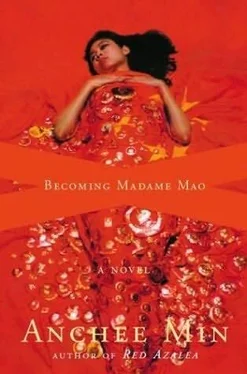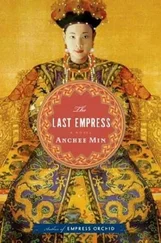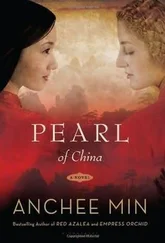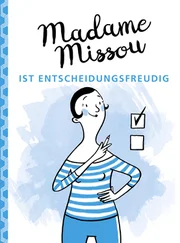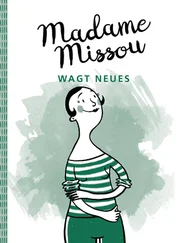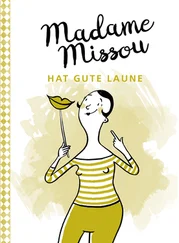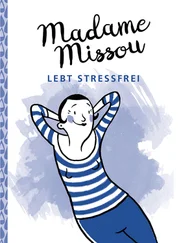Anchee Min - Becoming Madame Mao
Здесь есть возможность читать онлайн «Anchee Min - Becoming Madame Mao» весь текст электронной книги совершенно бесплатно (целиком полную версию без сокращений). В некоторых случаях можно слушать аудио, скачать через торрент в формате fb2 и присутствует краткое содержание. Жанр: Современная проза, на английском языке. Описание произведения, (предисловие) а так же отзывы посетителей доступны на портале библиотеки ЛибКат.
- Название:Becoming Madame Mao
- Автор:
- Жанр:
- Год:неизвестен
- ISBN:нет данных
- Рейтинг книги:4 / 5. Голосов: 1
-
Избранное:Добавить в избранное
- Отзывы:
-
Ваша оценка:
- 80
- 1
- 2
- 3
- 4
- 5
Becoming Madame Mao: краткое содержание, описание и аннотация
Предлагаем к чтению аннотацию, описание, краткое содержание или предисловие (зависит от того, что написал сам автор книги «Becoming Madame Mao»). Если вы не нашли необходимую информацию о книге — напишите в комментариях, мы постараемся отыскать её.
Becoming Madame Mao — читать онлайн бесплатно полную книгу (весь текст) целиком
Ниже представлен текст книги, разбитый по страницам. Система сохранения места последней прочитанной страницы, позволяет с удобством читать онлайн бесплатно книгу «Becoming Madame Mao», без необходимости каждый раз заново искать на чём Вы остановились. Поставьте закладку, и сможете в любой момент перейти на страницу, на которой закончили чтение.
Интервал:
Закладка:
Let's take a walk in the Summer Palace, he suddenly says and gets up.
She follows him without a word. She notices that he is wearing a pair of new leather shoes. She remembers that he hates new shoes. She asks if he wants to change into cotton sandals.
They don't hurt, he explains. Little Dragon has been my walking-shoe stretcher.
The Hall of Pines used to be a large courtyard of ancient trees. There are archways on its east, west and north sides. Also exquisitely carved pillar stones. The couple walks slowly through the trees. They are now on the central imperial path running parallel to a lake. It is the path on which Emperor Hsien Feng and Empress Tzu Hsi used to stroll. The path is narrow and is shaded by tall cypresses.
She follows his footsteps. After a mile the Glazed Tile Pagoda of Many Treasures comes into view. The pagoda is a seven-story, eight-sided building more than fifty feet high. It is inlaid from top to bottom with glazed bricks of blue, green and yellow. Multiple carvings of Buddha embellish the brickwork. The pagoda rests on a white stone platform and is crowned with a gilded pinnacle.
There is a melodious sound in the wind. Mao looks up. From the top of the pagoda hang bronze bells. She comes to his side. Wiping her damp forehead she praises his good health. He makes no comment and enters the pagoda. He doesn't pause as he passes a stone tablet on which is carved ODE TO THE IMPERIALLY BUILT PAGODA OF MANY TREASURES OF LONGEVITY HILL. The characters are in Chinese, Manchu, Mongolian and Tibetan. He comes to a stop before the statues of the Buddha.
I have come here twice already this month, he suddenly says. I have come to see if I can channel an understanding between the builder of this pagoda and myself.
His voice is low and she can barely hear him. But she says nothing.
He continues. My question is, Why did the man install over nine hundred statues of Buddha on the face of this tiny temple? What motivated him? What kind of madness? Was he panic-stricken? What was chasing him? It is a dangerous spot in which to work. He could fall any time. He might have fallen just so. Why? It seems to me Buddha was his protection-the more he built the better he thought himself protected. He must have been chased by this idea. He must have been breathless in this race with himself.
She suddenly senses that Mao is speaking of himself. About his position in the Politburo. The enemies he faces. He is in fear.
Chairman! she calls. I am with you heading to heaven or hell!
He turns toward her, his eyes filled with gentleness.
She feels that she is recognized the way she used to be recognized thirty years ago in the cave of Yenan. She hears her own voice once again proclaiming love between the dropping of bombs.
In her dedication he once again recognizes himself as a hero. Slowly his gaze diffuses. His voice becomes low. I wish that it was all just in my head. An old fart, paranoid for no reason. I wish that it were just the popping of my teeth I'm upset about. You won't believe that I clapped this morning when I made a smooth shit. A stupid thing, yet it controls my mood. I am losing my sight too, Jiang Ching. Now please tell me that what I feel isn't true-that I am old and I am going down the imperial drain.
She feels for him but is not unhappy. The truth is that his fear has made him see her. She needs to have the danger continue in order to be able to stay in his view.
Lead me to the fire! she says to him. Give me a chance to demonstrate how much I can and will do for love.
He reaches for her.
Once again she feels the presence of Lady Yuji. The worship comes back and charges itself. She reenters the scene. The lovers walk around the eight sides of Buddha statues surveying the nine hundred blue, green and yellow gods. The lovers are no longer in each other's arms and their lips do not caress, but they speak and begin to hear each other. They are taking turns describing the numberless beasts around them, obscure workers of the land, terrible innocents, killers and their dreams, the gigantic swarming of bees, the way they silently mate and murder.
Oh, heaven knows how much I feel for you! she cries in a theatrical voice. The line is stylish and self-moving. Command me, Chairman, here is my sword.
No more operating solo. No more living life in splendid isolation. My body has never felt so youthful. On April 9, I am bored listening to Mayor Peng Zhen's nonsubstantial self-criticisms. I leave the matter to Kang Sheng and Chen Bo-da, a critic executioner whom I recently recruited, and who is also the director of the Institute of Marxism and Leninism in Beijing. I send a report prepared by Chen Bo-da on Peng Zheng entitled "The 5.16 Notification" to Mao. By now I sense that Mao has set his mind on bringing down Vice Chairman Liu-punishing Mayor Peng, Liu's front man, is Mao's first step.
As expected, Mao comments on the report and orders the battle to be fought publicly.
May 4. A meeting finalizing Mayor Peng's fall takes place. The host is not Mao, but Vice Chairman Liu. Liu is given no option. He is incapable of bringing himself to rebel against Mao. At the meeting Liu looks pale. He takes deep breaths when he delivers the speech denouncing his friend. He reads in the name of the Politburo. He can barely sustain his performance. Peng has been a faithful employee and an ardent supporter of his programs.
Vice Chairman Liu never dreams that he will be the next. If he had spent time reading The Romance of the Three Kingdoms as Mao had, he might have anticipated his leader's plans.
To please Mao, on May 8, under the pen name Gao Ju-High Torch-I published an article entitled "Toward the Anti-Communist Party Group: Fire!" It is my first publication in thirty years. The article becomes the talk of the nation. Shouts of To guard Chairman Mao with our lives! are heard everywhere.
It is the night of May 9. I am losing sleep to joy. I have taken fate into my own hands and am rewarded. Mao phoned this morning to congratulate me. He wanted me to have a pack of his ginseng. The phone rang again in the afternoon. It was Mao's secretary. Mao wanted me to come for dinner. Nah is home, the message said.
I have nothing to wear, I said.
The secretary was confused. Does that mean "no"?
Sitting in my chair I feel my body shiver. He wants me, finally. All the years of resentment dissolve in one phone call. Am I crazy? Is he fooling me again? Or is it nothing but part of his aging? Or am I daydreaming? He has not stopped his longevity practice and continues to sleep with young girls; and yet he wants to reconnect with me. And he wants it badly.
Sometimes I feel that I know him well enough to forgive him-he is driven not by passion or lust or even his great love of country, but fear. Other times I feel that he has always been a stranger to me. An aloof, emotionally disconnected being like myself. He has never paid a single visit to his ex-wife Zi-zhen, or to his mentally disturbed second son Anqing in their hospitals. Just like me with my mother-I have never tried to find out what became of her.
Mao doesn't talk about the Korean War. It is to avoid his pain of missing Anying, his older son, who died from an American bomb. Mao has never recovered from Anying's death. Madame Mao Jiang Ching knows that Anying is always on his mind at moments of celebration, especially during Chinese New Years. Mao never accepts invitations to visit his friends or associates. It is because he can't stand the warmth of families. He says that he is an antitradition man. It is because everything traditional weaves around the family.
How can Mao not feel the loss or have sympathy toward pain and separation when he is such a passionate poet? One can only guess that his pain over the years has changed or, a more precise word, distorted his character. His longing for his losses gradually turns into envy of others' gain. Why does Vice Chairman Liu have all that he hasn't? Mao knows that he is by nature fragile and that to learn to be a stone-Buddha is his only way to survive. He takes tragedy in his life as his body's ulcer-he just has to live with it. Yet he is frustrated that he has no power to cure his pain. He doesn't understand that he owes himself compassion. He has taught himself to recognize no such word in his emotional dictionary.
Читать дальшеИнтервал:
Закладка:
Похожие книги на «Becoming Madame Mao»
Представляем Вашему вниманию похожие книги на «Becoming Madame Mao» списком для выбора. Мы отобрали схожую по названию и смыслу литературу в надежде предоставить читателям больше вариантов отыскать новые, интересные, ещё непрочитанные произведения.
Обсуждение, отзывы о книге «Becoming Madame Mao» и просто собственные мнения читателей. Оставьте ваши комментарии, напишите, что Вы думаете о произведении, его смысле или главных героях. Укажите что конкретно понравилось, а что нет, и почему Вы так считаете.
